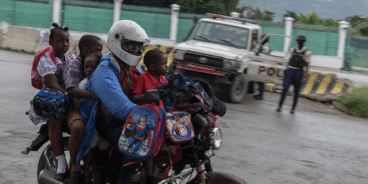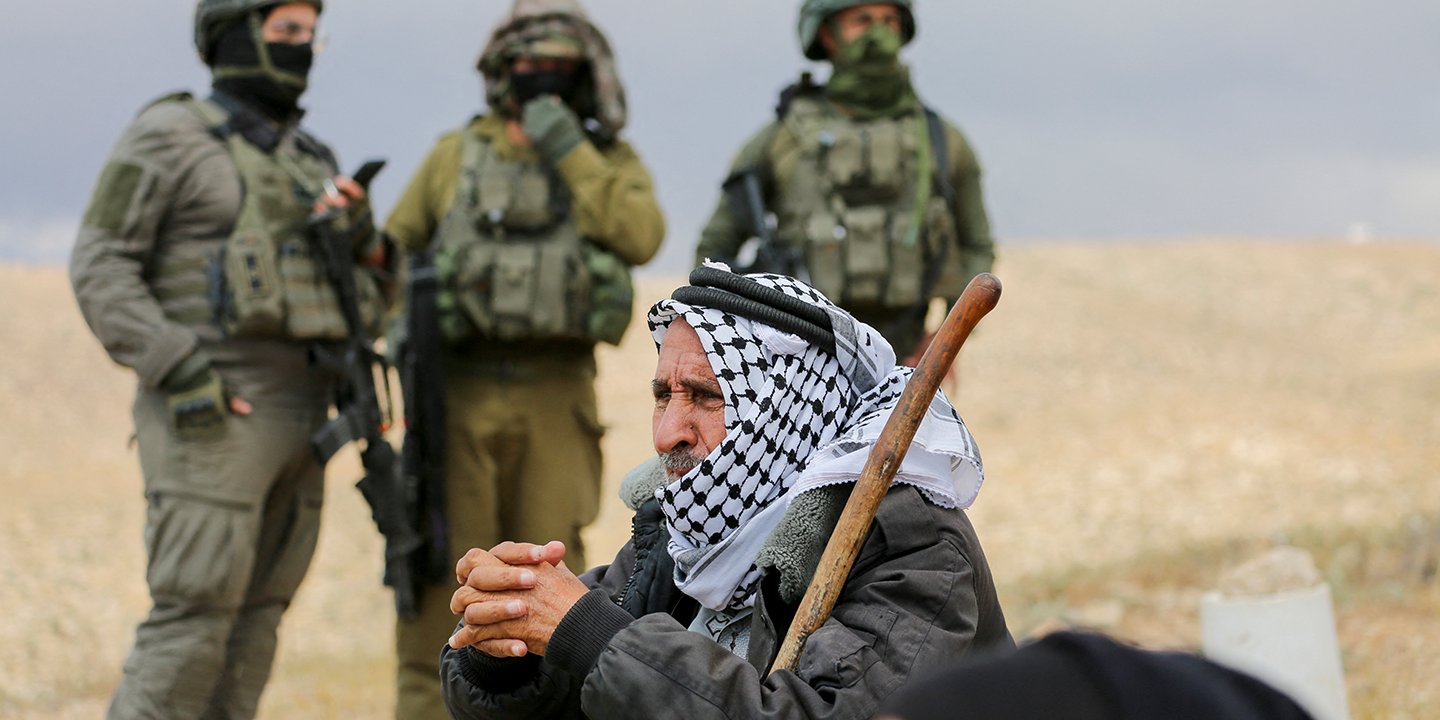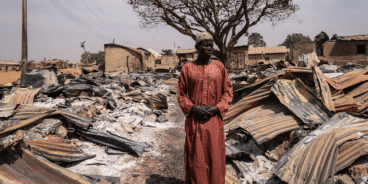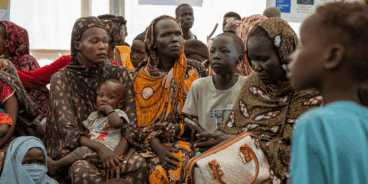

Atrocity Alert No. 446: Israel and the Occupied Palestinian Territory, Mozambique and Children and Armed Conflict
Atrocity Alert is a weekly publication by the Global Centre for the Responsibility to Protect highlighting situations where populations are at risk of, or are enduring, mass atrocity crimes.
ISRAELI FORCES ESCALATE FORCIBLE TRANSFER OF PALESTINIANS IN THE WEST BANK
On 18 June Israel’s Civil Administration issued a directive to reject all pending building and planning permits submitted by Palestinians in at least a dozen villages of the Masafer Yatta region in southern Occupied West Bank. The decision – based on a call from the Israeli army to clear the area for military training – would effectively facilitate the demolition of existing structures in the villages and the forcible displacement of some 1,200 residents. The Office of the UN High Commissioner for Human Rights (OHCHR) in the Occupied Palestinian Territory (OPT) condemned the decision, warning that the expulsion of the residents would amount to the war crime of forcible transfer and could also amount to a crime against humanity.
Masafer Yatta has long been a target of aggression by Israeli forces, with parts of the region falling under an Israeli-designated “firing zone,” which allows for areas to be reserved for military training purposes. In early May the village Khallet Athaba’ in Masafer Yatta was almost entirely destroyed after Israeli forces demolished more than 85 percent of homes and existing structures, according to the UN Office for the Coordination of Humanitarian Affairs (OCHA).
Since 1967 approximately 20 percent of the Occupied West Bank has been classified as a “firing zone” by Israel. Palestinian communities living in these areas have been obstructed from cultivating their land, faced difficulty accessing services and endured imminent risk of forcible transfer. OHCHR has condemned Israel’s use of “firing zones” as “one of the tools used by Israel, the occupying power, to confiscate Palestinian land and expand settlements.”
Since 7 October 2023 existing patterns of violence in the Occupied West Bank have escalated and OCHA has reported at least 6,463 Palestinians have been forcibly displaced after Israeli forces demolished their homes. Since the start of 2025, forced displacement, home demolitions and evictions by Israeli forces have further intensified. After launching a deadly military operation on 21 January in the northern West Bank, Israeli forces forcibly displaced over 40,000 Palestinians from several refugee camps, effectively emptying them of their residents.
Israel must rescind the directive to seize villages for military training in Masafer Yatta and halt any dispossession of Palestinian land. States must urgently intervene to protect Palestinians and prevent further illegal annexation of Palestinian land. UN member states, in compliance with the Advisory Opinion issued by the International Court of Justice, must ensure a rapid end to Israel’s unlawful presence in the OPT and refrain from providing any assistance that would sustain its continuation.
RISING ATROCITY RISKS AMID INSURGENCY AND CLIMATE PRESSURES IN MOZAMBIQUE
On 13 May the extremist group known locally as “Al-Shabaab,” loosely affiliated with the so-called Islamic State, ambushed Mozambican security forces near Mecula town, Niassa province. The attack was the latest in a resurgence of Al-Shabaab activity in recent months. The group perpetrated brutal attacks in late April in the Niassa Special Reserve – one of Africa’s largest conversation areas – killing at least 10 people and displacing approximately 2,000.
The impact of the violence has been particularly acute for children. In June Mozambican civil society groups, Human Rights Watch and the UN Children’s Fund reported a sharp rise in child abductions, with at least 120 children abducted over the past two months. Many children are forced into labor, marriage or fighting. While Al-Shabaab released some children abducted earlier this year, many remain missing. Returned children often face stigma and lack of reintegration support.
The UN Secretary-General’s latest report on children and armed conflict documented a sharp rise in grave violations in Mozambique in 2024. By contrast to 2023, recruitment and use of children by armed groups rose from 40 to 403 cases, abductions from 92 to 468 and killings and maimings from 8 to 44. These figures reveal a worsening, deeply entrenched pattern of abuse.
Climate change further compounds these risks, acting as threat multiplier and conflict driver. The violence at the Niassa Special Reserve, was the most significant insurgent incursion into the Reserve since 2021 and halted conservation efforts. Attacks on conservation areas not only disrupt protection efforts but also undermine environmental stability. Furthermore, populations displaced by Al-Shabaab violence since the launch of their insurgency in 2017 now face greater exposure to climate-related hazards such as flooding, cyclones and the impacts of El Niño, as many reside in low-lying coastal areas.
On 25 June the Southern African Development Community (SADC) held a landmark Ministerial meeting on forced displacement, fragility and climate resilience. In his opening remarks, Zimbabwe’s Minister of Local Government, H.E. Daniel Garwe, emphasized, “Fragility across the region is intensifying, driven by socio-political instability, economic hardship and environmental degradation.” While the meeting prioritized support for those affected by climate change, it failed to acknowledge the role of climate pressures in heightening atrocity risks.
Julia Saltzman, Mozambique expert at the Global Centre for the Responsibility to Protect, stated, “SADC and Mozambican authorities must adopt a comprehensive, prevention-centered approach that explicitly addresses how climate change intersects with atrocity risk factors. Without such integration, regional and national responses will remain incomplete.”
Urgent action is needed to protect civilians from further harm and to provide affected populations, especially children with access to medical care, psychosocial services and effective reintegration mechanisms. A climate-informed atrocity prevention agenda is essential to safeguarding vulnerable populations and restoring stability in northern Mozambique.
“UNPRECEDENTED LEVELS” OF GRAVE VIOLATIONS AGAINST CHILDREN IN CONFLICT ZONES
On 25 June the UN Security Council held its annual open debate on children and armed conflict and discussed the UN Secretary-General’s latest report on the issue, which documents 41,370 verified grave violations against children in 2024 – a staggering 25 percent increase from 2023 and the highest total since the UN’s Monitoring and Reporting Mechanism was established in 2005. These violations – including killing and maiming, recruitment and use, abductions, rape and other forms of sexual violence, attacks on schools and hospitals and the denial of humanitarian access – have reached unprecedented levels and many may constitute war crimes or crimes against humanity.
The 2024 report covers 25 country situations and one regional monitoring arrangement (Lake Chad Basin). Killing and maiming was the most prevalent violation, affecting 11,967 children. Verified cases of rape and sexual violence rose by 35 percent, including a “dramatic” increase in gang rape. More children were subjected to multiple violations, including overlapping patterns of abduction, recruitment and sexual violence – described as “an alarming escalation of brutality.” These figures likely reflect only a fraction of actual violations due to access and documentation challenges. Sheema Sen Gupta, Director of Child Protection at the UN Children’s Fund, emphasized, “This year’s report from the Secretary-General once again confirms what too many children already know — that the world is failing to protect them from the horrors of war. Each violation…represents a moral failure.”
The majority of violations occurred in countries experiencing or recovering from atrocity crimes. The highest numbers were recorded in Israel and the Occupied Palestinian Territory (IOPT), the Democratic Republic of the Congo (DRC), Somalia, Nigeria and Haiti. For the second consecutive year, IOPT topped the list with 8,554 verified violations – the most ever recorded in a single reporting period – with Israeli forces responsible for 7,188 of the violations. While non-state armed groups were responsible for approximately half of all verified violations, government forces were again the main perpetrators of attacks on schools and hospitals, killing and maiming and denying humanitarian access.
Each year, the Secretary-General includes an annex naming parties responsible for grave violations, known as the “list of shame.” This year’s report listed new parties in the Central African Republic, Colombia, DRC and Haiti. This includes the Viv Ansanm coalition of gangs, which launched a coordinated offensive targeting critical civilian infrastructure across Port-au-Prince in 2024 and perpetrated recruitment and use of children, killing and maiming, rape and other forms of sexual violence and attacks on schools and hospitals.
Protecting children in conflict is essential to upholding the Responsibility to Protect and demands urgent political will. States should ratify and implement the Optional Protocol to the Convention on the Rights of the Child, the Paris and Vancouver Principles, the Safe Schools Declaration and the EWIPA Political Declaration. All parties must comply with International Humanitarian Law, and states must use their leverage to uphold global norms and hold perpetrators accountable. All perpetrators must be held to the same standard, regardless of whether they are state forces or non-state armed groups.
Related Content


Atrocity Alert No. 469: Nigeria, Israel and the Occupied Palestinian Territory and South Sudan
